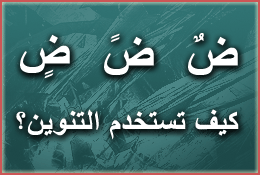-
 Desmond saysThu 12th Nov 09@09:04 amI found the lesson fascinating and thought-provoking. Nunation is a complex topic, and the example sentences discussed in the lesson contain some very interesting words. Take the adjective "aniiq" (ﺃﻨﻴﻖ), for instance. According to most of the online dictionaries I've consulted, it corresponds to English words like "elegant", "stylish", "fashionable" or "dressy", the Spanish adjective "elegante" or the German adjective "schick". There is, however, a website where an anonymous person affirms that the item in question (transcribed as "aneeq") means "clever" and can be used as a boy's name, and there is an online Islamic dictionary where "aniiq" is rendered not only as "stylish", but also as "thin" and "slender". I've run a Google search with the aid of the Lessan dictionary, but can find no examples where "aniiq" could mean "thin" or "slender". "Aniiq" seems to collocate mainly with words denoting clothing.
Desmond saysThu 12th Nov 09@09:04 amI found the lesson fascinating and thought-provoking. Nunation is a complex topic, and the example sentences discussed in the lesson contain some very interesting words. Take the adjective "aniiq" (ﺃﻨﻴﻖ), for instance. According to most of the online dictionaries I've consulted, it corresponds to English words like "elegant", "stylish", "fashionable" or "dressy", the Spanish adjective "elegante" or the German adjective "schick". There is, however, a website where an anonymous person affirms that the item in question (transcribed as "aneeq") means "clever" and can be used as a boy's name, and there is an online Islamic dictionary where "aniiq" is rendered not only as "stylish", but also as "thin" and "slender". I've run a Google search with the aid of the Lessan dictionary, but can find no examples where "aniiq" could mean "thin" or "slender". "Aniiq" seems to collocate mainly with words denoting clothing. -
Hey Guys,
I wonder if it's advisable to do the usual drop-outs of the ta'a marbourta while reading the Holy Quoran?
May God give you the ability and determination to carry on with these lessons!
-
Marhaban Iamson227!
I'm glad you mentioned the phonetic problems posed by Coranic recitations. Have you noticed the way the word "'ajaban" (amazing) is pronounced in the surah al-kahf (ayah 9)? It's pronounced the way it is spelt, i.e. without "nuun". However, if you listen to the Islamic cartoon video about truthfulness (ﺍﻠﺼﺪﻖ) you'll notice that the word in question is pronounced as if the final letter were "nuun". -
I've just discovered some interesting information about "naqqal" and "jawwaal". "Naqqal", which occurs in one of the example sentences in this lesson, is apparently used in Kuwait, while "jawwaal", which has been discussed in previous lessons, is used in Saudi Arabia.
I found this nugget of information in a very readable article about international search engine optimization. The authors of the article seem to be very knowledgeable. Among other things, they draw parallels between Arabic and Spanish. Since Spanish, like Arabic, is spoken in many different countries, different words are often used to denote identical objects in Spain and in other parts of the world. The English noun "car", for instance, will be rendered as "coche" in Spain and "carro" in South American countries. -
I would agree with your conclusion Desmond, which is أنيق collocates with words denoting clothing.
Regarding to pronouncing the (taa marbootah) and the (tanween), if you get back to the podcast (check 3:44) always you drop the taa marbootah and the tanween if any of them comes before a pause or at the end of the sentence.
Your example guys from the Quran, the word (3ajaban) comes at the end of the aayah, so you drop the tanween (it becomes 3ajabaa), but if you don't stop, then you have to pronounce the tanween, so you'll say (3ajaban id' awaa...).
Lastly, interesting enough, mobile phone has also another name used in Sham area, which is 7'alawy. If I match these lables to their English equivalent, then Jawwaal and Naqqaal would go with Mobile, and 7'alawy goes with Cellular.
Intermediate - More on tanween
| November 10th, 2009 | 1 comment |
We discuss the subject of tanween further, particularly concerning the rules on adding tanween to various structures of a word. Sometimes, you might have to add an additional letter to the word to accommodate the tanween. The grammatical rules discussed in the lesson might seem complicated at first, but we hope that, after some practice, they will come naturally as you get used to them.
 |
 MP3 Download MP3 Download
 PDF Transcript PDF Transcript
|
 Audio Transcript Audio Transcript Exercise Exercise |
|
| Basic | Premium | |
|---|---|---|
Join the Discussion

Random Word
مع السلامة |
|

Advertisement

